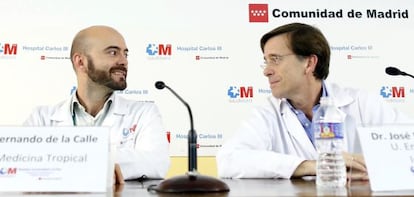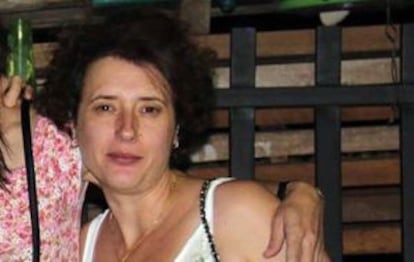Carlos III doctors most experienced in treating Ebola in developed world
Nursing aide’s “enormous physical and mental strength” were key to her recovery, they say

“This is the first time in history that we have treated Ebola patients in developed countries,” says José Ramón Arribas, head of infectious diseases at Carlos III-La Paz Hospital and one of the doctors on the team who treated Spanish nursing aide Teresa Romero.
Romero, who was declared free of the disease on Tuesday, is one of three Ebola patients to be treated at Carlos III, which makes doctors at the hospital’s tropical diseases department the most experienced team in the developed world so far.
The other two were missionaries who died at the hospital after being repatriated from western Africa. Romero is thought to have contracted the disease after cleaning the room of the second missionary.
A team of 50 people has been looking after the 44-year-old nursing aide since she was admitted to Carlos III with a high fever on October 6. For a week before that, she had gone about her everyday life despite experiencing symptoms of the disease. Repeated calls to Carlos III did not get her admitted; instead, she was told to go to her local health center and hospital.
As a result, 14 people who were in contact with Romero while she was infectious have been kept in isolation at Carlos III as a preventive measure, although none has shown signs of developing the disease.
The team of doctors, nurses, nursing assistants, hospital porters and other health workers have been subjected to intense stress throughout these two weeks, said Marifé Bravo, head of the hospital’s psychiatry and mental health department. Her unit had two people permanently available to assist all the individuals under observation, as well as their relatives and hospital workers.
“We saw a need to work with them [the staff] as well,” said Bravo. “The patient is a colleague who they had emotional ties to, and there was evidence that they themselves had been at risk. There have been situations of great anxiety.”
When it became clear, after Romero became infected, that hospital workers stood a chance of contracting the virus, tasks such as donning and removing the protective suits that were required to enter a patient’s room took on added difficulties.

“Taking off the suit not only requires knowledge and training, it also requires significant emotional control,” explained Bravo. “There was a great deal of stress and exhaustion because they had a huge workload, and went through a lot of tension and difficulties finding new shifts of professionals [ready to do the job].”
Romero has been feeling increasingly strong since her blood tests came back negative for the virus, a family spokeswoman said.
Arribas noted that her “enormous physical and mental strength” have been key to her recovery. The nursing assistant received support treatment – enough liquids and salt to prevent dehydration – and two experimental therapies whose role in Romero’s recovery remain unclear, the medic noted.
“Without a control group, we cannot know whether they add any effectiveness. Every team in the world treating Ebola patients has the same kind of uncertainty,” said Arribas.
The medical team added that a country is considered free of the Ebola virus when 42 days have elapsed since the recovery of the last recorded patient. If no other cases arise after Romero, Spain will be officially free of the virus on December 2.
Tu suscripción se está usando en otro dispositivo
¿Quieres añadir otro usuario a tu suscripción?
Si continúas leyendo en este dispositivo, no se podrá leer en el otro.
FlechaTu suscripción se está usando en otro dispositivo y solo puedes acceder a EL PAÍS desde un dispositivo a la vez.
Si quieres compartir tu cuenta, cambia tu suscripción a la modalidad Premium, así podrás añadir otro usuario. Cada uno accederá con su propia cuenta de email, lo que os permitirá personalizar vuestra experiencia en EL PAÍS.
¿Tienes una suscripción de empresa? Accede aquí para contratar más cuentas.
En el caso de no saber quién está usando tu cuenta, te recomendamos cambiar tu contraseña aquí.
Si decides continuar compartiendo tu cuenta, este mensaje se mostrará en tu dispositivo y en el de la otra persona que está usando tu cuenta de forma indefinida, afectando a tu experiencia de lectura. Puedes consultar aquí los términos y condiciones de la suscripción digital.








































